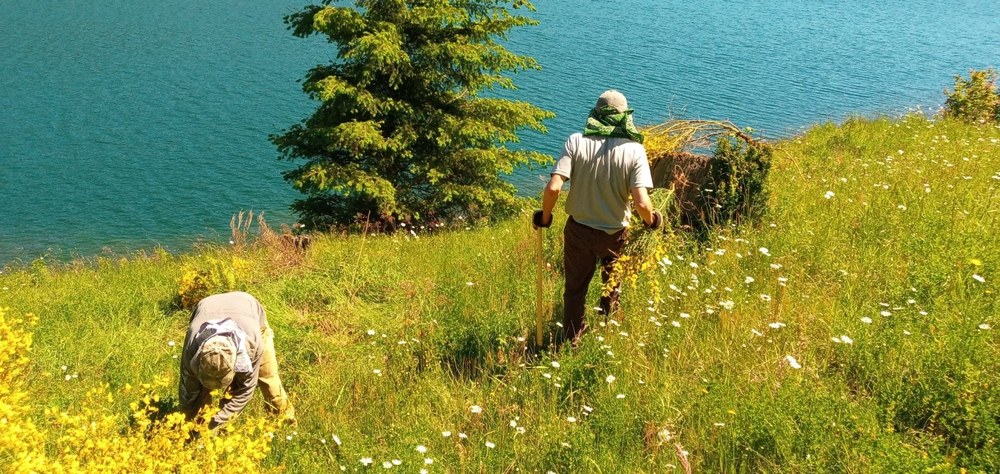
Olympia Mountaineers have been busy this year! We're back in full force now that COVID-19 restrictions have loosened, and our hard work has already made a big impact. Read about two recent projects branch members undertook, and get inspired for your own stewardship day this season.
LNT Outreach at the Mt. Townsend Trailhead
Olympia Mountaineers Zua Stivers, Kathy Weller, and Jim French worked in conjunction with the Northwest Forest Service over Memorial Day weekend as Public Outreach Volunteers to help protect the Quilcene Drainage. Port Townsend and surrounding communities are having issues with water quality, and city officials came together to work with the Northwest Forest Service in order to help make people aware that what they do in the backcountry has a direct impact on the health and wellness of the surrounding communities.
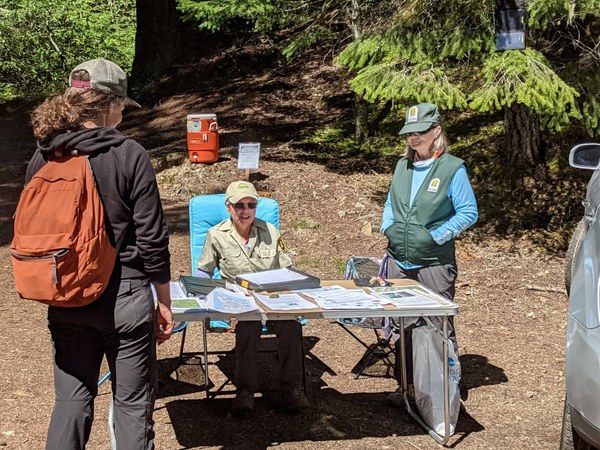 Kathy Weller and Zua Stivers speak with a hiker. Photo by Jim French.
Kathy Weller and Zua Stivers speak with a hiker. Photo by Jim French.
The Quilcene Drainage is in an important watershed, providing public drinking water for nearby communities on the Olympic Peninsula, including residents of Eastern Jefferson County and the City of Port Townsend. The Lower Big Quilcene, Tunnel Creek, Upper Big Quilcene, Mount Townsend, Notch Pass, Deadfall, Little Quilcene, and Sink Lake Trails are all within this sensitive watershed area.
National forests and grasslands are the primary source of drinking water for over 60 million people nationwide. Our volunteers asked each hiker, backpacker, and visitor to please do their part to help protect this valuable watershed by following a few simple guidelines when recreating in the area.
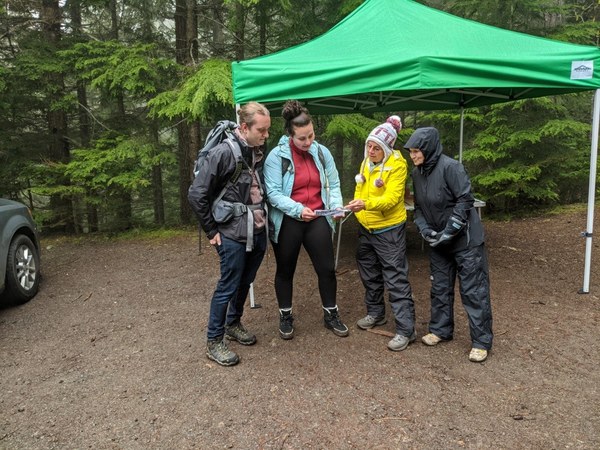 Kathy Weller and Zua Stivers discussing LNT Principles with hikers. Photo by Jim French.
Kathy Weller and Zua Stivers discussing LNT Principles with hikers. Photo by Jim French.
The volunteers set up their presentation information booth at the Mt. Townsend trailhead, where they engaged hikers, backpackers, and visitors in discussions about Leave No Trace Principles. They collected trash, handed out dog poo bags for those folks who forgot the necessary accoutrements for their furry hiking buddies, and collected data for the Forest Service on group size, origin, and destination. They also asked for feedback regarding what obstacles trail users have around following LNT practices.
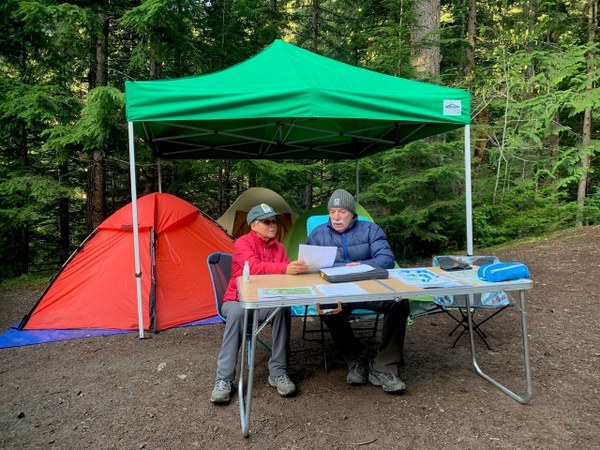 Kathy Weller and Jim French all set up and ready to talk about LNT Principles. Photo by Zua Stivers.
Kathy Weller and Jim French all set up and ready to talk about LNT Principles. Photo by Zua Stivers.
Our volunteers had steady visitor contact all weekend long, with the hiker response to our outreach efforts being overwhelmingly positive. The hikers were inquisitive, attentive to LNT survey questions, and open to lessons on wilderness ethics.
The Memorial Day weekend saw over a hundred people a day, the earliest group departing at 6am to the latest returning at 11pm. Some said they had to park 1/2 mile up the road from the trailhead. Those returning from the summit willingly shared their observations, and some took the time to give us detailed reports including issues they observed.
Jim French noted that 40% of the hikers commented on missing a crucial turn on their hikes due to lack of signage. Some also got lost or missed their turn because they followed other lost hikers’ footprints in snow.
Scotch Broom Removal at Mt. St. Helens
The Olympia Mountaineers worked with the Northwest Forest Service, Mt. St. Helens Institute, and Mt. St. Helens National Monument to assist in the control of Scotch broom and other invasive vegetation around the Coldwater Science and Learning Center and Coldwater Lake in the Mt. St. Helens National Volcanic Monument.
This was a unique opportunity for Mountaineers wanting to perform volunteer work in the region, and to help protect the Mt. St. Helens National Monument at the spectacular Coldwater Lake.
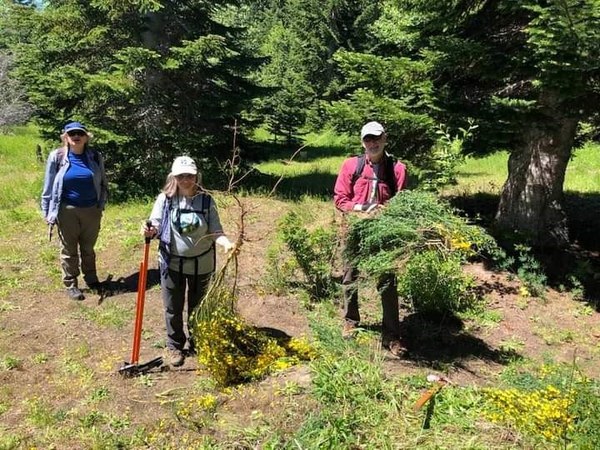 Mt. St. Helen’s Scotch broom removal team. Photo by Jim French.
Mt. St. Helen’s Scotch broom removal team. Photo by Jim French.
“Working on volunteer projects at Mt. St. Helens is a great experience,” said Jessica Kimmick of the Mt. St. Helens Institute. “Where else do you get to help protect a developing ecosystem in the shadow of an erupting volcano?”
41 years after the violent 1980 eruption of Mt. St. Helens, volunteers lend their hands to pull noxious weeds, repair damaged trails, and help out at staff visitor centers. “Volunteers are a critical part of our efforts to provide visitor services and protect this special place,” said Tom Mulder, Monument Manager. “Given our limited resources and aging facilities we can’t do it alone.”
Arrangements were made for the volunteers to camp near the Science and Learning Center on top of the west Ridge of Coldwater Lake. The camping facilities, although primitive, included a “to-die-for view” of Mt. St. Helens.
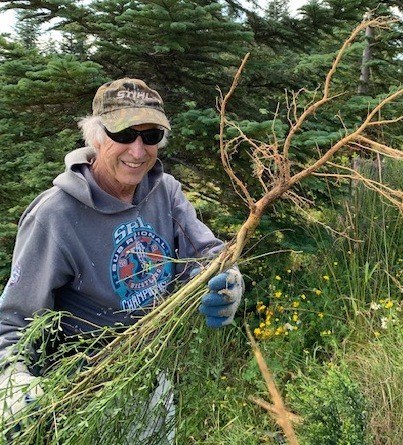 Rich Curtis vs. Scotch Broom. Photo by Zua Stivers.
Rich Curtis vs. Scotch Broom. Photo by Zua Stivers.
Rich Curtis of the Olympia Mountaineers shared his thoughts on volunteering: “For me, just being able to work with a great group of people in such a magnificent setting is rewarding.”
Volunteer With Us!
Volunteering is a great way to spend a day outdoors while having a positive impact on our ecosystems and trails. Meet great people, have fun, and make a difference! You can find stewardship activities on our 'Activities' page, or by using the button below:
 Regina Robinson
Regina Robinson